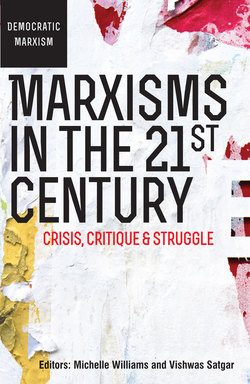Читать книгу Marxisms in the 21st Century - John Saul - Страница 8
На сайте Литреса книга снята с продажи.
Conclusion
ОглавлениеIn the late 1990s and early twenty-first century there has been a renewed interest in Marxism. Together, the chapters in this volume provide a refreshingly rich and creative engagement with Marxism, and challenge us to think beyond the comfort zone of our certainties and to open our minds to varied approaches to Marxism. While the volume offers a range of perspectives on Marxism, there are also important common strands that hold the diverse viewpoints and themes together. All the chapters take as their starting point a sympathy toward a critical Marxism, a rejection of vanguardism, a desire for and appreciation of involvement in political practice, and a belief that there is enough in Marxism broadly defined to make it relevant and necessary in the contemporary phase of capitalism.
This renewal of Marxism demonstrates a commitment to retrieving the critical impulse in Marxist thought and to drawing on new sources of Marxism to make sense of the contemporary contradictions of global capitalism. What is particularly interesting about the Marxism(s) emerging is the willingness to question the foundations of ‘Marxism’ and to look reflexively to new ways of integrating Marxism(s) today. The Marxism of today is anchored in new forms of rebellious activity that mark it apart from the deferential, vanguard politics of the twentieth century and has shifted from the academy to struggles led by the exploited themselves through participatory democratic processes. The chapters that make up this volume force us to rethink our dyed-in-the-wool understandings of Marx and Marxism. Issues of democracy, ecology, feminism, critique, globalisation, historical lessons and questions of agency, as well as lineages of thought from a range of anti-capitalist traditions, must feature in our engagements with Marxism for the complex age in which we live.
Note
1 Like all political parties, the SACP has varying factions vying for power. The shifts in ideological focus partly reflect which faction has come to the fore at any given time.
References
Callinicos, A. 1999. Social Theory: A Historical Introduction. New York: New York University Press.
Glaser, D. and Walker, D. 2010. Twentieth Century Marxism: A Global Introduction. London and New York: Routledge.
Hobsbawm, E. 2011. How to Change the World: Tales in Marx and Marxism. London: Little, Brown and Company.
Renton, D. 2004. Dissident Marxism: Past Voices for Present Times. London and New York: Zed Books.
SACP (South African Communist Party). 2012. ‘Political Report to the 13th Congress’. Report presented to the 13th Congress of the South African Communist Party, 11–15 July.
Therborn, G. 2008. From Marxism to Post-Marxism. London: Verso.
